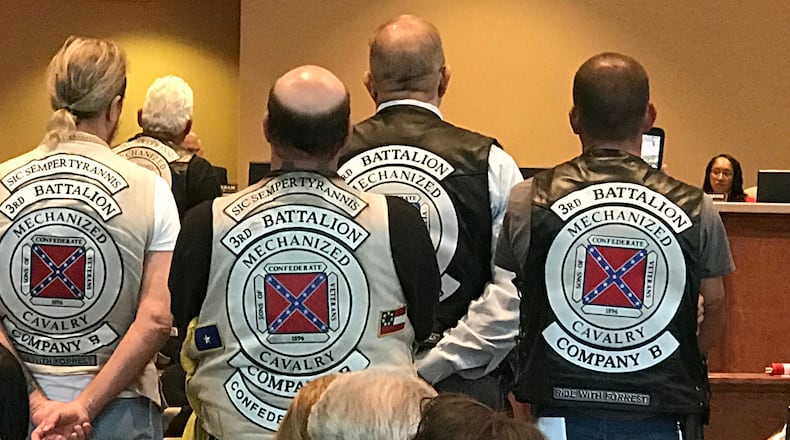In the face of a divided room, with half the audience supporting her and the other calling for her resignation, Henry County Commissioner Dee Clemmons said she would stand her ground amid a Confederate flag issue that has smothered the County for weeks.
“This, too, shall pass,” Clemons said during a break in the more than four-hour commission meeting. “I’m not afraid of anybody here.”
Though commission chair June Wood told commenters to direct their statements to her, many who attend the meeting in protest of the closing of a museum at Nash Farm Battlefield repeatedly directed their dismay, ire and frustration at Clemmons. Clemmons has become a lightening rod for her role in events that led to the museum’s closure last month.
“I hope y’all will let the museum reopen,” said John Hall of Dublin, there in defense of the flag. “Her whole point was to get those white folks.”
While there were several supporters of Clemmons, they were slightly outnumbered by flag supporters.
Clemmons’ advocates saw a case that revolved around race and disrespect. To a large degree, her detractors saw the same thing but from a different vantage point.
With the removal of the flag, they said, they saw an assault on their Southern heritage. When the flag was aloft on the battlefield, which is county property, the flag’s opponents saw an assault on theirs.
“We will not be silent about the Confederate flag issue any more,” said Eugene Edwards, Henry County NAACP president. “We’re tired of it.”
The Georgia NAACP weighed in on the controversy surrounding the removal of the Confederate flag from a Civil War Battlefield in Henry County and the closure of the field's museum.
In a statement issued before Henry County Commissioners prepared to meet Tuesday morning, the state NAACP urged the commission to keep the flag off the Nash Farm Battlefield, which is owned by the county. Last month, the Nash Farm Museum abruptly closed when a donor pulled his extensive collection of Confederate relics and artifacts. The donor made the move after a Henry County Commissioner asked that battle flags be removed from view at the front of the property.
“Hate has no place in modern society and without a doubt, the Confederate flag continues to be a divisive symbol that many believes represents hate,” Georgia NAACP President Francys Johnson wrote in a statement. “It is a constant visible reminder of a disgustingly dark and deadly time for African Americans in this country.”
The statement went on to praise Henry County Commissioner Dee Clemmons. Clemmons found herself at the center of the firestorm after she requested the battle flag be removed not only from a flag pole in front of the building, but from windows visible from the street. The battlefield is in her district.
The commission chamber was packed as dozens of flag supporters prepared to give statements in support of the museum. Several carried signs demanding Clemmons’ resignation. But there was also a heavy contingent of NAACP supporters. Police presence was heavy both inside and outside the county government building.
The museum’s board decided to close the exhibits and shut down the 7-year-old facility last month after the donor, upset over Clemmons’ requests, packed up his thousands of artifacts and left the display cases virtually empty.
Clemmons said she did not ask the museum to get rid of all its Confederate items, only to relocate them elsewhere in the museum. She said she’d received complaints from constituents who were offended by the flag. The museum’s board, however, said in Facebook posts and interviews that Clemmons had pressured them to remove all references related to the Confederacy. Later, the board president told the Atlanta Journal-Constitution that Clemmons had been a supporter of the museum as a candidate and promised to protect it.
Clemmons told the AJC that she was not trying to erase history, but wanted the 204-acre park, which the county bought more than 10 years ago for $8 million, to have a more inclusive mission. In March, Clemmons sent an email to Commission Chair June Wood outlining broad plans to turn part of the park into a health and wellness destination.
Over the Memorial Day weekend the accusations escalated. Clemmons found herself under attack from hundreds of the museum's supporters, Confederate descendants and sympathizers.
The NAACP said those supporters weren’t looking at the full picture, which it said included the legacy of slavery.
“Many will suggest that the removal of monuments is akin to destroying culture or that the Friends of Nash Park, a group that many citizens contacting the NAACP believes is sympathetic to the views of the KKK, have a First Amendment right to the displays,” Johnson said in the statement. “That is simply not true.”
Before speaking at the commission meeting, Edwards joined in the state NAACP’s statement, saying “I hope that any museum claiming to portray an accurate historical accounting of (the) Civil War would provide context from all perspectives including the slaves who endured unspeakable horrors. Likewise symbols of hate, should be placed in museums for teachable moments and for positive growth.”
In a statement last week, the Henry Commission said it was looking into the circumstances surrounding the museum's closure, but did not say it would be reopened.
About the Author
The Latest
Featured



